Zero Gravity Dining: The Future of Space Food Tourism
Imagine floating above Earth, savoring a Michelin-style meal while weightless, each bite suspended in mid-air, and the planet spinning slowly below you. This is not science fiction — it’s the future of zero gravity dining experiences, merging culinary excellence with aerospace adventure. For luxury travelers, food enthusiasts, and space tourists, this is a once-in-a-lifetime gastronomic journey beyond the confines of Earth.
1. The Dawn of Space Food Tourism
The concept of space tourism is evolving rapidly. By 2026–2028, private aerospace companies are expected to integrate luxury dining experiences in orbit, providing:
- Multi-course meals in microgravity: Carefully designed to float and remain edible.
- Zero-gravity cocktails and drinks: Drinks that hover in mid-air, creating visual and taste sensations.
- Panoramic Earth views: The ultimate backdrop for a dining experience.
Companies like SpaceX, Blue Origin, and Orbital Cuisine are pioneering orbital gastronomic adventures, turning dining into an interstellar experience that blends science, art, and luxury.
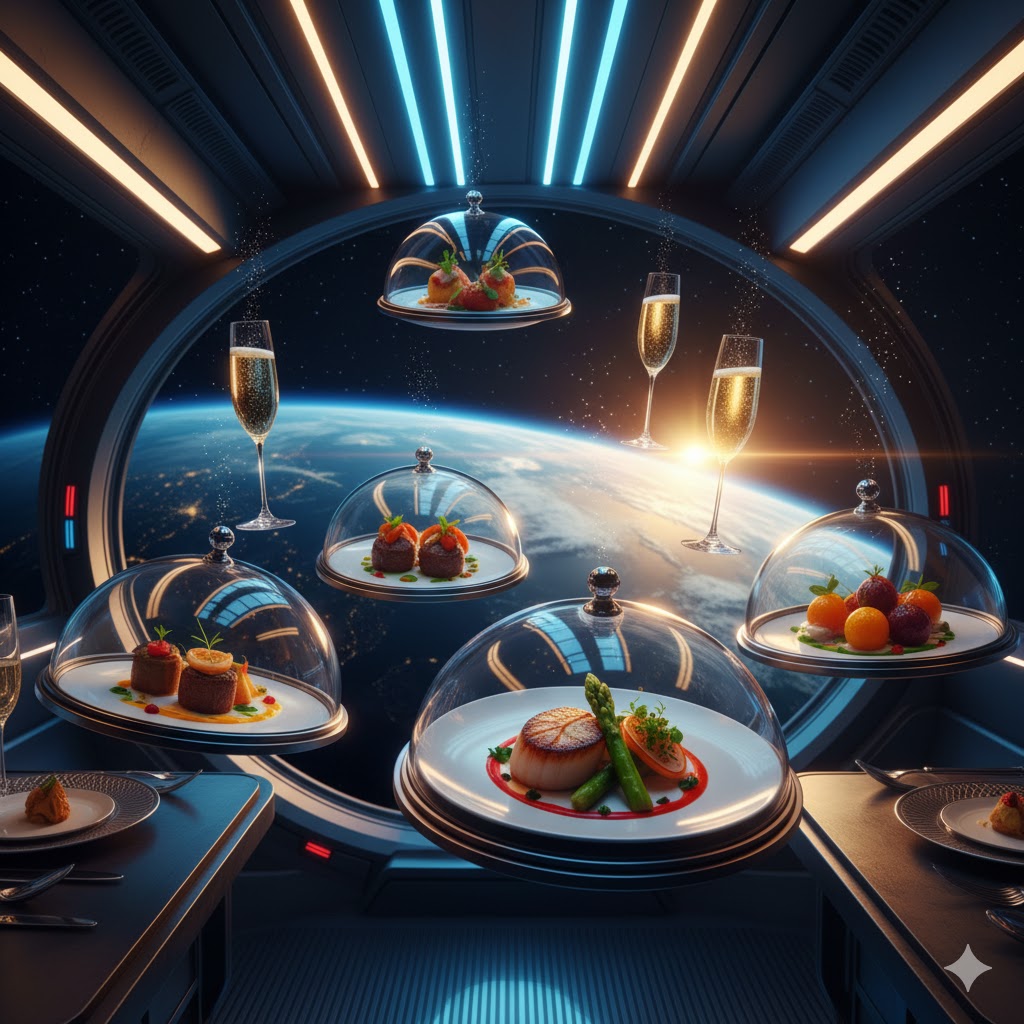
2. Michelin-Style Meals Designed for Orbit
Chefs face unique challenges in creating meals for zero gravity:
- Ingredient transformation: Dehydrated or freeze-dried components rehydrated in orbit to preserve flavor and texture.
- Presentation innovations: Floating amuse-bouches, levitating desserts, and dishes designed to move with the diner’s motion.
- Beverage engineering: Drinks contained in flexible pouches or magnetic cups to prevent floating spills.
Each meal is not just a feast for the palate but a visual spectacle, combining aesthetics, taste, and the thrill of weightlessness.

3. The Science Behind Floating Cuisine
Space dining requires advanced scientific collaboration between chefs, engineers, and nutritionists:
- Floating crumbs and particles: Special packaging and preparation prevent hazards in microgravity.
- Temperature and preservation: Meals must maintain flavor and safety without conventional ovens or freezers.
- Custom utensils: Magnetic or tethered cutlery allows diners to enjoy meals without losing pieces to zero gravity.
These innovations ensure safety, taste, and a seamless luxury experience in orbit.
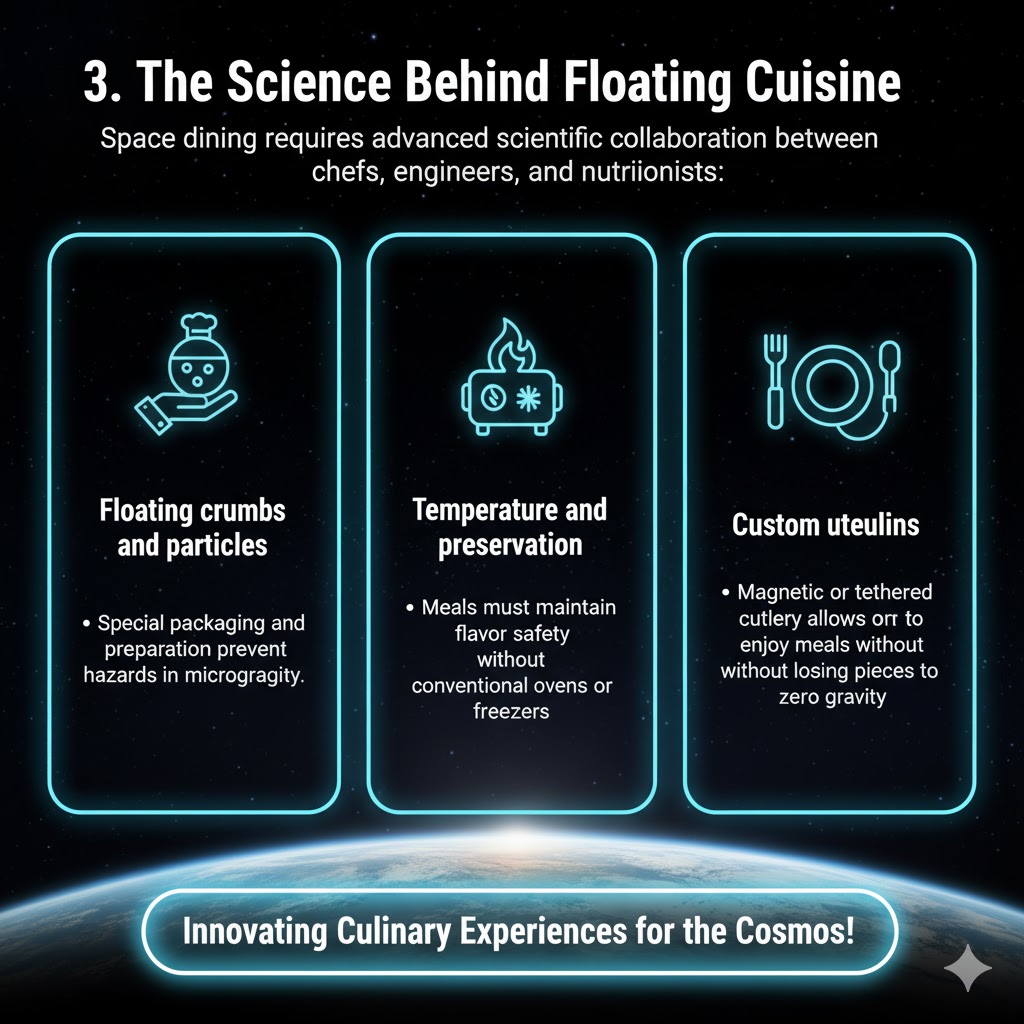
4. Orbital Dining Capsules: Luxury Redefined
Luxury space dining capsules are being designed as immersive culinary theaters:
- Panoramic windows: For 360-degree views of Earth and distant stars.
- Mood lighting: Adjustable to enhance ambiance and complement courses.
- Private or communal seating: Options for romantic dinners or group adventures.
The interiors blend futuristic design with comfort, including stabilized tables, magnetic plates, and tethered chairs, ensuring diners feel secure while floating.
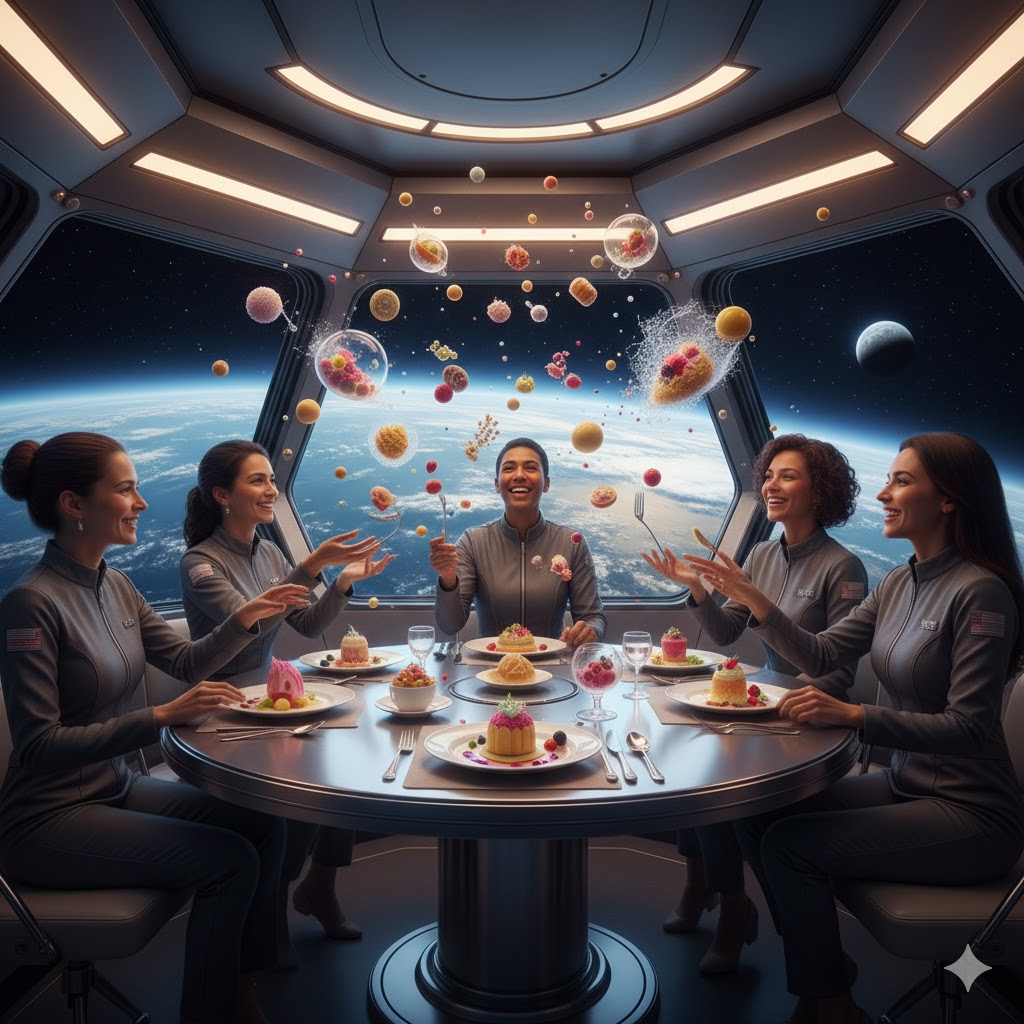
5. Sensory Transformation: Earth vs. Space Dining
| Feature | Earth Fine Dining | Zero-Gravity Dining Experience |
|---|---|---|
| Environment | Restaurants on Earth | Orbit capsules with panoramic Earth views |
| Gravity | Normal | Microgravity, floating food and drinks |
| Menu Design | Traditional plating | Engineered for zero-G consumption |
| Sensory Appeal | Taste and aroma | Taste, visual spectacle, floating sensation |
| Luxury | Chef-driven experiences | Michelin-style in orbit, once-in-a-lifetime adventure |
While fine dining on Earth stimulates taste and aroma, orbital dining heightens every sense, creating a multidimensional culinary journey.
6. Culinary Storytelling in Orbit
Imagine a menu themed around the solar system:
- Appetizer: “Meteorite Bites” — floating, bite-sized delicacies shaped like lunar rocks.
- Main Course: “Orbital Surf & Turf” — microgravity seared beef and space-grown vegetables, rehydrated to perfection.
- Dessert: “Comet Crème Brûlée” — caramelized top floating above a smooth custard base, with tiny edible stardust sprinkles.
- Beverage: “Cosmic Cocktail” — nitrogen-infused drinks forming tiny floating spheres.
These dishes combine art, taste, and weightless experience, making each course memorable and visually stunning.
7. Sustainability and Space Cuisine
Zero-gravity dining also integrates sustainability practices:
- Efficient resource use: Minimal water, packaging, and energy use for food preparation.
- Recyclable and biodegradable containers: Reducing space debris.
- Space-grown ingredients: Early hydroponic crops supplement meals and reduce dependency on Earth resupply.
The eco-conscious approach ensures that luxury space tourism doesn’t compromise planetary or orbital safety.

8. Planning Your Zero-Gravity Dining Experience
Travelers can prepare for zero-gravity dining by:
- Booking through certified operators: SpaceX, Blue Origin, Orbital Cuisine.
- Pre-flight training: Weightlessness adaptation, safety briefings, and motion acclimatization.
- Customizing meals: Dietary restrictions and gourmet preferences can be tailored.
- Capturing memories: Special cameras and video equipment capture floating culinary experiences.
Preparation ensures a seamless, unforgettable orbital gastronomic adventure.
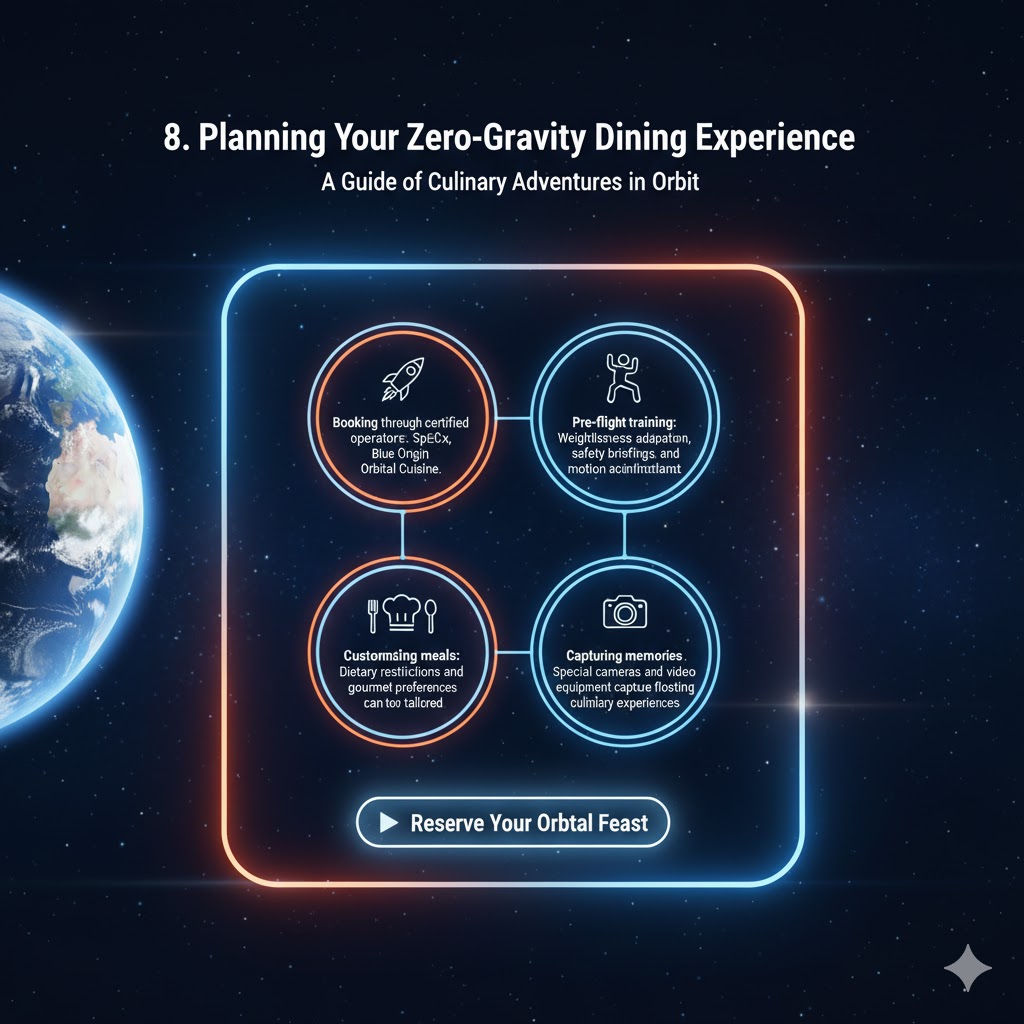
9. Unique Experiences in Zero Gravity
Beyond meals, diners can enjoy:
- Floating wine tastings: Microgravity sommeliers guide paired beverages with meals.
- Zero-gravity cooking demonstrations: Chefs showcase techniques unique to orbit.
- Cosmic dining events: Celebrations with live entertainment and Earth’s panorama.
Every meal is both a culinary and theatrical experience, creating stories that will be remembered for a lifetime.
10. Integration with Lunar and Martian Tourism
By 2028, zero-gravity dining may expand to:
- Lunar orbit stations: Pairing meals with lunar sightseeing excursions.
- Martian colonies: Adapting culinary techniques for Mars habitats, blending low gravity with sustainable farming.
- Cross-planet gastronomic tours: Gourmet itineraries combining orbital, lunar, and Martian experiences.
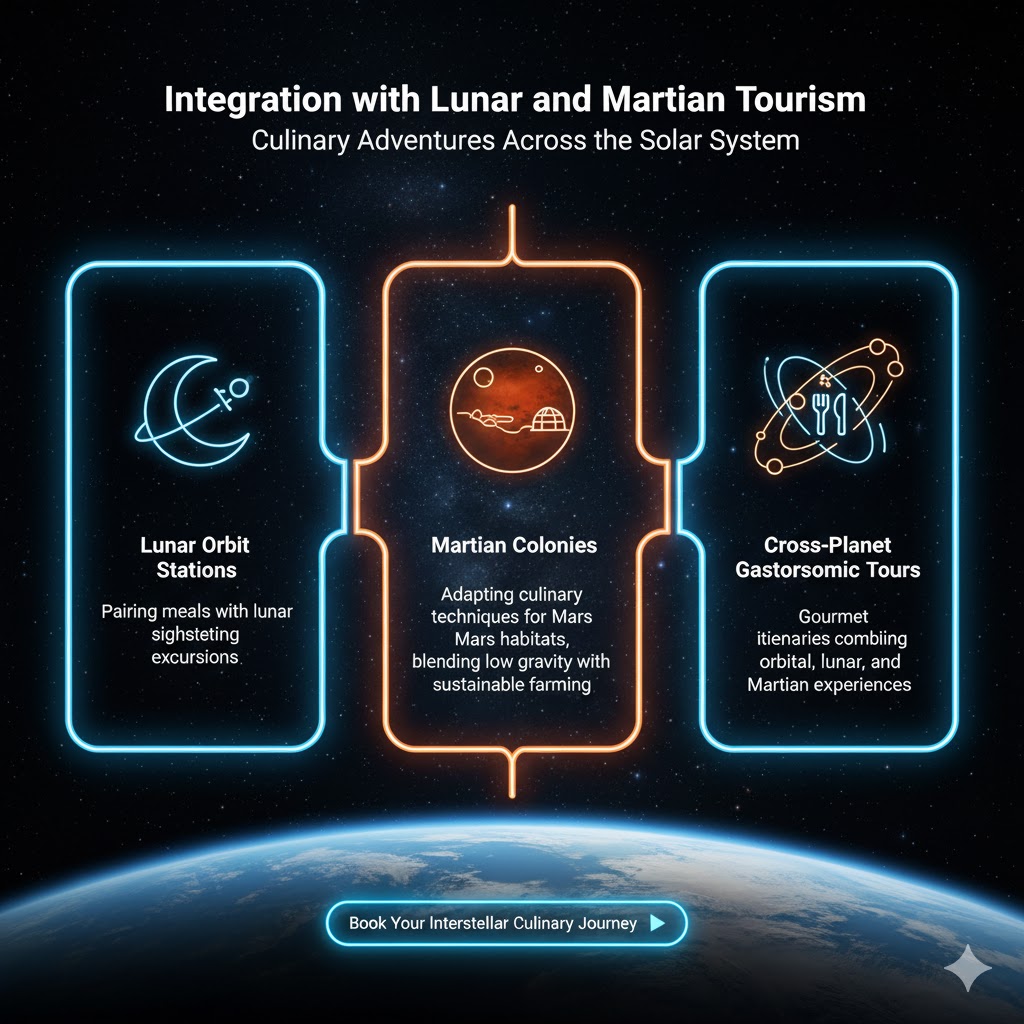
This ensures that space food tourism becomes a global and interplanetary luxury experience.
11. Emotional and Experiential Impact
The zero-gravity dining experience offers psychological and emotional benefits:
- Perspective shift: Seeing Earth while eating creates awe and mindfulness.
- Romantic connections: Couples share extraordinary moments in a surreal setting.
- Inspiration and creativity: Floating cuisine and cosmic views spark imagination.
These benefits make zero-gravity dining a transformative experience, not just a meal.
Traveler Review:
The zero gravity dining experience represents the next frontier of culinary tourism, combining Michelin-style excellence with the thrill of orbit. By 2026–2028, travelers will savor floating gourmet dishes with Earth as their backdrop, creating memories beyond imagination. Luxury, innovation, and adventure converge to redefine how and where we eat, proving that the ultimate culinary journey is no longer confined to Earth.
FAQs
Q1: How safe is zero-gravity dining?
Ans: Orbital dining capsules are engineered for safety, with pre-flight training, tethered seating, and special utensils to prevent floating hazards.
Q2: What kind of meals are served?
Ans: Michelin-style multi-course meals designed for microgravity, including floating appetizers, rehydrated gourmet mains, and desserts with visual spectacle.
Q3: How can I book a zero-gravity dining experience?
Ans: Book through space tourism operators such as SpaceX, Blue Origin, or Orbital Cuisine, including pre-flight briefings and custom meal options.
Q4: Is zero-gravity dining eco-friendly?
Ans: Yes, meals use recyclable containers, efficient water and energy usage, and space-grown ingredients to minimize environmental impact.
Must Read:
- Interstellar Honeymoons: Love Stories Written Among the Stars
- Lunar Glamping: Camping Under the Moon’s Surface Domes

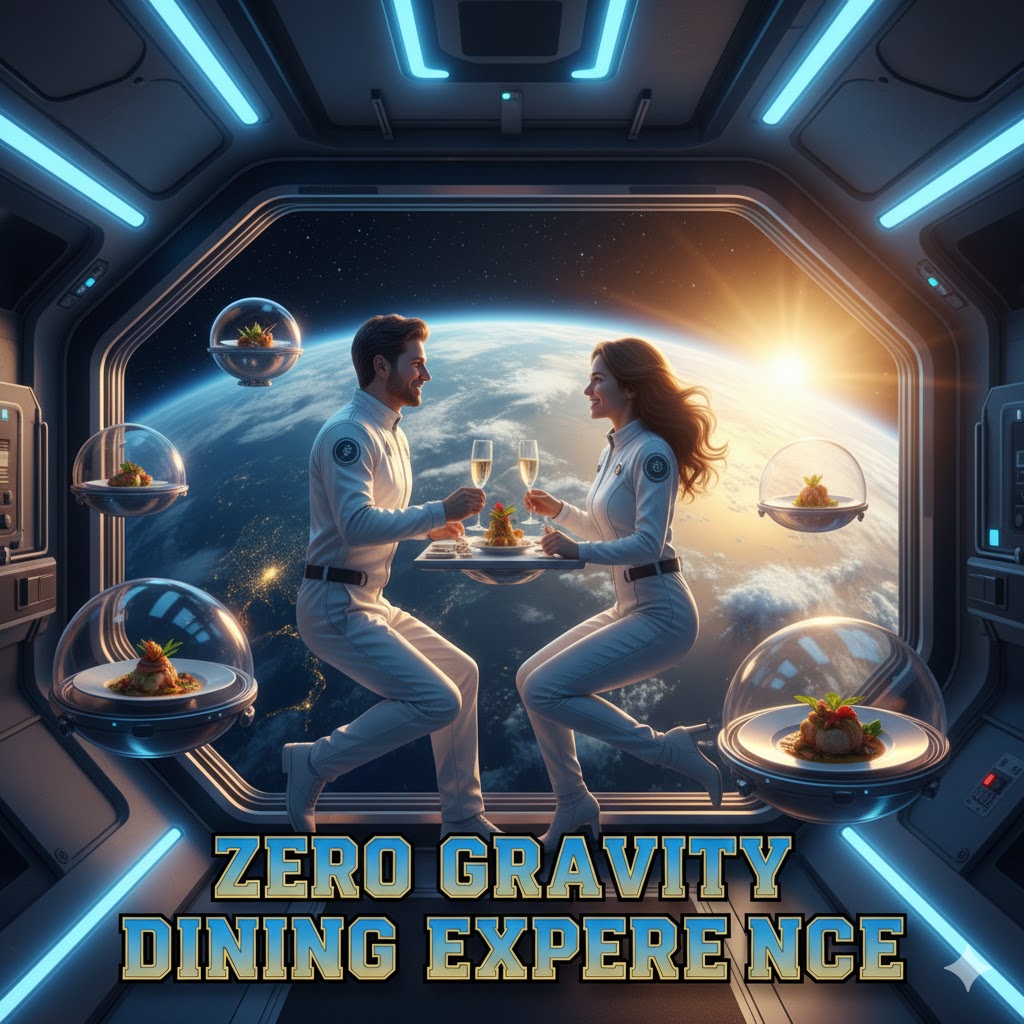


Pingback: Lunar Biosphere Tourism: Best Future of Green Life Beyond Earth (2030s Vision)